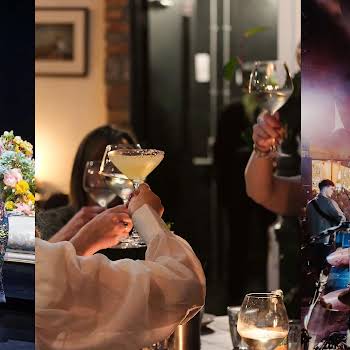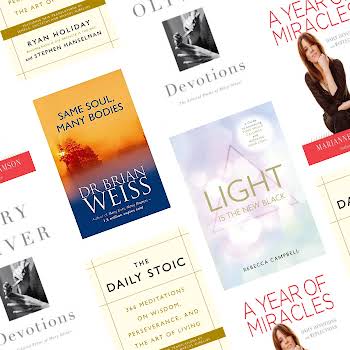
By Jennifer McShane
16th Dec 2019
16th Dec 2019
I read so many books that it seems impossible that any would stay with me for very long but those that do, I always read more than once. Below are eight that I’ve re-read (at least twice) which you’re guaranteed to love — and pick up again when you’ve finished.
Karl Keary’s Montpelier Parade

Karl Keary’s Montpelier Parade, a tender, real tale of love between two people from completely different worlds is a captivating debut from the Dublin-born author. Our story begins and ends in a gloomy, rain-sodden Dublin but the vivid characters keep the setting bright. Sonny is just 16-years-old and lives a lonely life in a difficult, working-class home but he’s hungry for the world, for a bigger and better future. Everything changes when he meets the beautiful Vera, so much older and wiser than he.
Her house is on Montpelier Parade, just across town, but to Sonny, she represents a different world. A chance encounter leads to first-time love for Sonny, but all isn’t as it seems — what exactly is Vera hiding? A luminous, moving story that is full of heart.
Lisa Carey’s The Stolen Child

Lisa Carey’s The Stolen Child does what few tales dare to — get inside your head and refuse to leave. Set on a mysterious windswept island off the coast of Ireland, St Brigid, the story centres on its intriguing community and follows two sisters: Rose blessed with beauty and disfigured Emer, who was blinded in one eye by a swarm of bees and who has a curse — she can harm with a simple touch of her hands.
The Islanders are stuck in the past, their way of life under threat as they are forced to move to the mainland but the arrival of Brigid, a stranger who befriends the sisters, will change everything that they know. This is a captivating, eerily beautiful book; full of mistrust, dark magic and superstition — you won’t be able to put it down.
J.P. Pomare’s Call Me Evie

In J.P. Pomare’s Call Me Evie (Sphere, approx. €13.99, out now) Kate Bennet has had something bad happen to her. Really bad. Our 17-year-old narrator is feisty and trying to flee from an older man, Jim, who isn’t really her uncle. He says he’s keeping her safe, that it’s for her own good when, in fact, he is keeping her a virtual prisoner in a rural, isolated New Zealand hideout. If it’s all for her own good, then why did he shave her head and start calling her Evie? They are on the run, that much is clear. But why? And from whom?
Jim, who will only refer to those they are running from as they, won’t say anything about it. But Evie knows something terrible happened. A video. Humiliation. Rage. Only she can’t remember a thing. Slowly shifting between before she fell into Jim’s clutches and afterwards, she tries to remember, to piece together what happened that traumatic night so she can finally make her escape. You might think you can foresee the end, but you have no idea. This is a striking, meticulous debut — and you’ll never see those jaw-dropping twists coming. Gripping psychological suspense at its very best.
Laurie Frankel’s This Is How It Always Is

Author Laurie Frankel drew on her own personal experiences to write her debut This Is How It Always Is and it makes this already beautiful story all the more tender for it. Rosie and Penn are parents to four rowdy sons; their family is just like any other until Claude, their youngest, quietest boy, declares that when he grows up, he wants to be a girl. This is anything but an “issue” book; it’s a tender tale of how a family tries to change and adapt to ensure their much-loved child moves towards becoming transgender.
Even during its sad moments, it remains an enchanting read and, refreshingly, it doesn’t attempt to wrap up such a complex theme in a neat bow — it makes a subject, of which many have no real understanding, seem normal.
Beth Underdown’s The Witchfinder’s Sister

In Beth Underdown’s engrossing first novel, Matthew’s sister Alice returns to her native Essex in 1645 after her husband is killed. But her brother is no longer the same. There are rumours in this small town of witchcraft and a book in which he obsessively collects women’s names. Soon Alice is horrified to discover her brother is plotting to exterminate the women of the village that he deems guilty of witchcraft. Terrifying and so relevant to the times we live in.
Sally Rooney’s Conversations With Friends

I didn’t know what to expect when I first read Conversations with Friends, the vibrant debut from Irish writer Sally Rooney, but from the first chapter, I knew it was something special. Francis is 21, a writer and poet and best friends with her former lover Bobbi. Melissa and Nick are older, glamorous and married.
Gradually their lives intertwine, and Francis gets more complicated as she embarks on a passionate affair with Nick. There are infidelities, intimacies, sorrow, some laughter and at times, crippling period pain. The prose is elegant, intelligent, witty — and a re-read cemented that I preferred it to her second novel, Normal People.
Sarah Schmidt’s See What I Have Done

Sarah Schmidt’s debut, the much-hyped See What I Have Done is a reimagining of the infamous, unsolved Lizzie Borden case of 1892, where 32-year-old Lizzie Borden was put on trial for the brutal, bloody murder of her father and stepmother. The bodies of Andrew and Abby Borden are discovered — he’s found on the sitting room sofa, she upstairs on the bedroom floor — both murdered with an axe.
Australian novelist Schmidt revisits the frequently told story already immortalised in many a film and TV show, this time telling it from differing points of view. Who did it? The maid? Lizzie’s sister Emma? Or did Lizzie get away with murder? A claustrophobic, gripping story that lingers long after the final page has been turned.
Sarah Henstra’s The Red Word

The Red Word by Sarah Henstra (Tramp Press, approx. €14.99, out now) is the author’s first adult outing. Set in the mid-nineties, she uses a poignant setting of an Ivy League college campus to examine cultural mythology and how it might imbue our daily behaviour. Canadian student Karen becomes embroiled with members of a sorority-bashing, fraternity-loathing feminist group while living in an off-campus house, nicknamed Raghurst.
To stand out, she dates Mike, a member of a notorious fraternity, Gemma Beta Chi. Word gets out that fellow fraternity member, Bruce Comfort has gotten a girl pregnant and refuses to accept responsibility, so the Raghurst ringleader Dyann decides to drug or ‘roofie’ the entire fraternity at a party. But after a woman ends up gang-raped after accidentally consuming the drug, rumours spread on campus like wildfire over what exactly happened — and who committed the horrific assault. Henstra expertly uses Greek myths to explore sexuality, debauchery, power dynamics and misogyny with sensitive and sharp writing — and a keen understanding of what is an extremely complex subject matter.























